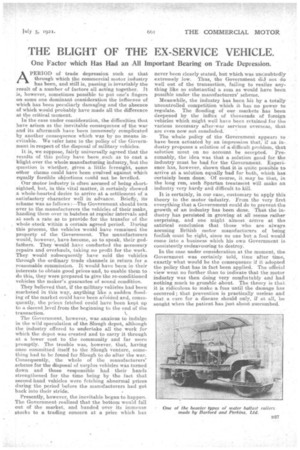THE BLIGHT OF THE EX-SERVICE VEHICLE.
Page 23

If you've noticed an error in this article please click here to report it so we can fix it.
One 'Factor which Has Had an All Important Bearing on Trade Depression.
APERIOD of trade depression such as that through which the commercial motor industry has been, and still is, passing is invariably the result of a number of factors all acting together. It is, however, sometimes possible to put one's fingers on some one dominant consideration the influence of which has been peculiarly damaging and the absence of which would probably have made all the difference at the critical moment.
In the ease under consideration, the difficulties that have arisen as the inevitable consequence of the war and its aftermath have been immensely complicated by another consequence which was by no means inevitable. We refer here to the policy of the Government in respect of the disposal of military vehicles.
It is, we suppose, fairly universally agreed that the results of this policy have been such as to cast a blight over the whole manufacturing industry, but the question is whether, given a. little foresight, some other theme could have been evolved against Which equally forcible objections could not be levelled.
Our Motor industry is often accused of being shortsighted, but, in this vital matter, it certainly sbowed a whole-hearted desire to arrive at a. settlement of a satisfactory character well in advance. Briefly, its scheme was as follows :—The Government should turn. over to the manufacturers the vehicles of their make, handing them over in batches at regular intervals and at such a rate as to provide for the transfer of the 'whole ,stock within a certain agreed period. During this process, the vehicles would have remained the property of the Government. The manufacturers would, however, have become, so to speak, their godfathers. They would have conducted the necessary repairs and overhauls, taking no profit for the work. They would subsequently have sold the vehicles through the ordinary trade channels in return for a reasonable commission. It would have been in their interests to obtain good prices and, to enable them to do this, they were prepared te give the re-conditioned vehicles the maker's guarantee of sound condition.
They believed that, if the military vehicles had been: marketed in this way, anything like a sudden flooding of the market could have been asioided and, consequently, the prices fetched could have been kept up to a decent level from the beginning to the end of the transaction. k..
The Government, however, was anxious, to indulge in the wild speculation of the Slough depot, although the industry offered to undertake all the work for which the depot was created and to carry it through at a lower cost to the community and far inore promptly. The trouble was, however, that, having once committed itself to the Slough venture, something had to be found for Slough to do after the war. Consequently, the whole of the manufacturers' scheme for the disposal of surplus vehicles was turned down and those responsible had their hands strengthened for the time being by the fact that second-hand vehicles were fetching abnormal prices during the period before the manufacturers had got
back into their stride. ,
Presently, however, the inevitable began to happen. The Government realized that the bottom would fall out of the market, and handed over its immense stocks to a trading concern at a price which has never been clearly stated, but which was unc:oubtedly extremely low. Thus, the Government did not do well out of the transaction, failing to realize anything like so substantial a sum as would have been possible under the manufacturers' scheme.
Meanwhile, the industry has been hit by a totally uncontrolled competition which it has no power to regulate. The flooding of our markets has been deepened by the influx of thousands of foreign vehicles which might well have been retained for the various necessary after-war services overseas, that are even now not concluded.
The whole policy of the Government appears to have been actuated by an impression that, if an industry proposes a solution of a difficult problem, that solution must on no account be accepted. Presumably, the idea was that a solution good for the industry must be bad for the Government. Experience has, however, shown that it is quite possible to arrive at a solution equally bad for both, which has certainly been done. Of course, it may be that, in the long run, such Spartan treatment will make an industry very hardy and difficult to kill.
It is certainly, in our case, customary to apply this theory to the motor industry. From the very first everything that a Government could do to prevent the growth_ of an industry has been done. That the industry has persisted in growing at all seems rather surprising, arid one might almost arrive at the satirical conclusion that those who are alwa,y-s accusing British motor manufacturers of being foolish must be eight, since no one but a fool would come into a business which his owe Government is consistently endeavouring to destroy.
In the ease under consideration at the moment, the Government was certainly told, time after time, exactly what would be the consequence if it adopted the policy that has in fact been applied. The official view went no further than to indicate that the motor industry was then doing very comfortably and had nothing much to grumble about. The theory is that it is ridiculous to make a fuss until the damage has occurred ; that prevention is practically useless and that a cure for a disease should only, if at all, be sought when the patient has just about succumbed.
































